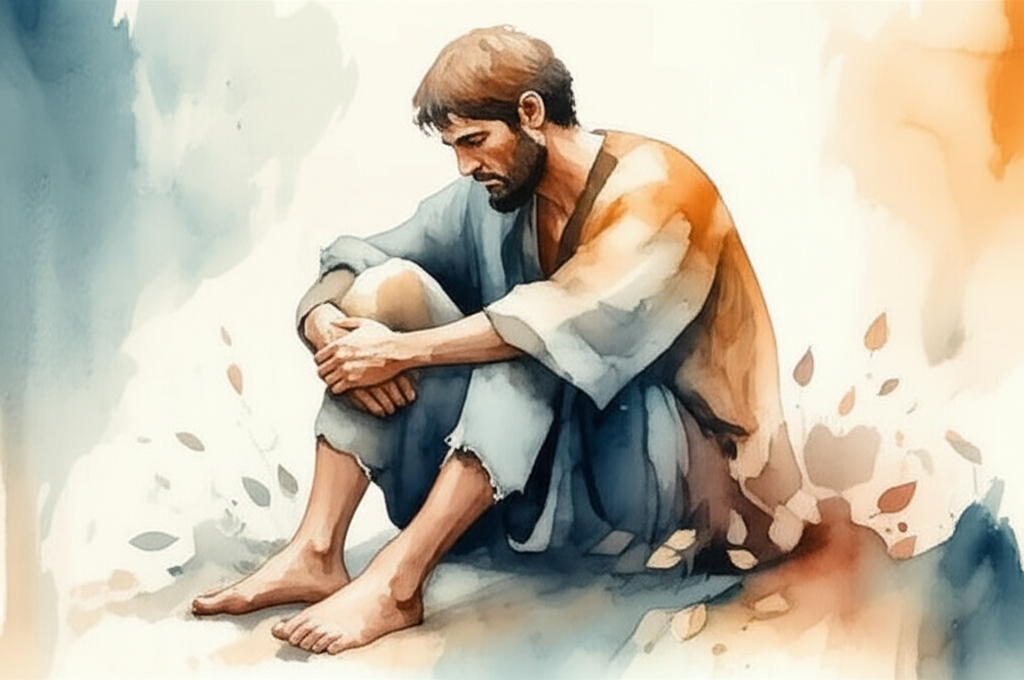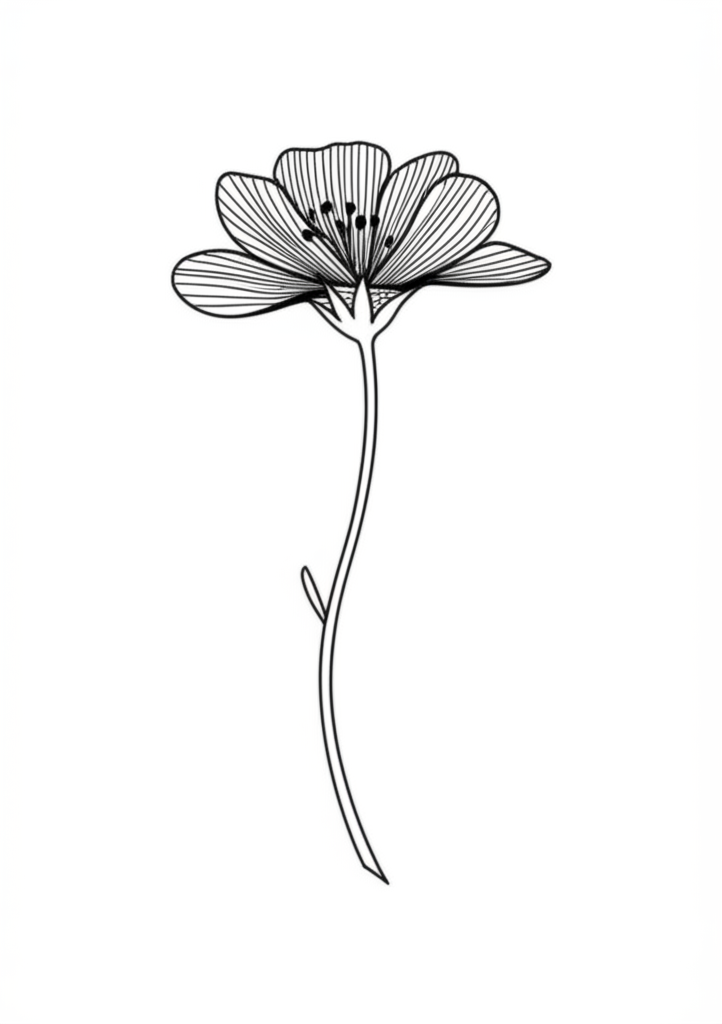Job 14 meaning explained in AI Summary
Job Chapter 14 continues Job's lament and his exploration of the brevity and fragility of human life. Here's a summary:
1. The Fleeting Nature of Life (1-6): Job compares man's life to a flower that quickly withers and a fleeting shadow. He emphasizes the shortness and troubles of life, questioning why God would even bother with such frail creatures.
2. Hope for a Tree (7-12): Job uses the metaphor of a tree that can sprout again even after being cut down to express a glimmer of hope. He wonders if there might be a similar possibility for humans after death. Could there be a resurrection, a time when he could be remembered and called back by God?
3. Longing for a Reprieve (13-17): Job expresses a desperate wish that God would hide him in Sheol (the grave) until His anger passed, a place of respite until a time of restoration. He acknowledges God's constant watch over him, even his sins, and feels overwhelmed by it.
4. The Finality of Death (18-22): Job contrasts the hope of a tree with the seemingly irreversible reality of human death. He describes how mountains crumble and rocks wear away, highlighting the finality of death and the loss of hope and memory it brings.
Overall Message: Chapter 14 is a poignant reflection on the limitations of human existence and the pain of suffering. Job grapples with the seeming finality of death while clinging to a faint hope of renewal and resurrection. He questions God's ways but also acknowledges His power and presence in his life. This chapter highlights the universal human struggle with mortality and the deep longing for meaning and hope beyond the grave.
Job 14 bible study ai commentary
Job 14 serves as a profound meditation on the brevity and fragility of human life, contrasting it with the seeming permanence of nature. Job, in his third speech, continues his lament directly to God, questioning the purpose of existence when it is so short, filled with trouble, and seemingly ends in absolute finality. The chapter hinges on the desperate question, "If a man dies, shall he live again?" exposing Job's struggle between the grim reality he observes and a faint, desperate yearning for a future renewal and vindication from God.
Job 14 context
The immediate context is Job's response to the rigid theology of his friend Zophar (Job 11), who insisted Job's suffering was a direct result of hidden sin. In ancient Near Eastern cultures, concepts of the afterlife were often bleak. Mesopotamian belief depicted a gloomy, dusty underworld, and Egyptian beliefs, while more elaborate, were not the framework for Hebrew thought. The Old Testament concept of Sheol (the grave or realm of the dead) was predominantly a place of silence, darkness, and separation from the living and from God, without the detailed revelation of resurrection and eternal life later found in the New Testament. Job operates within this limited understanding, making his questions and faint hopes all the more remarkable.
Job 14:1-2
“Man who is born of a woman is few of days and full of trouble. He comes out like a flower and withers; he flees like a shadow and does not continue.
In-depth-analysis
- "born of a woman": This phrase emphasizes humanity's frail, earthly origin and shared mortality, distinct from spiritual beings. It underscores universal human weakness.
- "few of days": A direct statement on the brevity of life. The Hebrew conveys a sense of being 'cut short'.
- "full of trouble": Life is not only short but also characterized by turmoil, unrest, and sorrow (rogez).
- Flower/Shadow Metaphors: These are classic biblical images for transience.
- Flower: Represents beauty that is extremely fragile and temporary. It blossoms and quickly fades.
- Shadow: Represents existence that is insubstantial and fleeting. It has no permanence and disappears when the light source moves.
Bible references
- Psa 103:15-16: "As for man, his days are like grass; he flourishes like a flower of the field; for the wind passes over it, and it is gone..." (Direct parallel of the flower metaphor).
- Jas 4:14: "...you are a mist that appears for a little time and then vanishes." (Echoes the transient nature of life).
- 1 Pet 1:24: "For 'all flesh is like grass, and all its glory like the flower of grass. The grass withers, and the flower falls...'" (Quotes Isaiah, confirming the OT theme).
- Psa 90:5-6, 10: "...they are like grass that is renewed in the morning... in the evening it fades and withers... The years of our life are seventy..." (Moses' prayer on life's brevity).
Cross references
Gen 3:17-19 (life of toil), Job 7:6 (life is fleeting), Psa 39:4-6 (life as a breath), Psa 144:4 (man like a breath), Eccl 2:23 (days of sorrow).
Job 14:3
And do you open your eyes on such a one and bring me into judgment with you?
In-depth-analysis
- "open your eyes on such a one": Job expresses shock that the infinite, eternal God would fixate His scrutinizing gaze on something so pathetically frail and short-lived.
- "bring me into judgment": This highlights the overwhelming mismatch. Job sees it as fundamentally unfair for God to bring a creature of dust into a legal contest with the Almighty Creator. It’s an impossible trial from the start.
Bible references
- Psa 144:3: "O LORD, what is man that you regard him, or the son of man that you think of him?" (Expresses the same awe and bewilderment at God's attention).
- Psa 8:4: "what is man that you are mindful of him, and the son of man that you care for him?" (A positive reflection on the same theme, contrasting Job's lament).
- 1 Cor 1:27-29: "But God chose what is foolish... what is weak... to shame the strong... so that no human being might boast in the presence of God." (NT perspective on God's focus on the weak).
Cross references
Job 7:17-18 (Why magnify man?), Psa 130:3 (If you mark iniquities, who can stand?).
Job 14:4
Who can bring a clean thing out of an unclean? There is not one.
In-depth-analysis
- This is a foundational statement on inherent sinfulness, often called the doctrine of original sin.
- Job argues that since humanity is born from an "unclean" source (mortal, fallen humanity), it is impossible for a "clean" (morally pure) individual to emerge.
- This verse serves as part of his legal defense: How can God judge him so harshly for being exactly what humanity is—flawed from the start?
Bible references
- Psa 51:5: "Behold, I was brought forth in iniquity, and in sin did my mother conceive me." (David's classic statement on inherited sin).
- Rom 5:12: "Therefore, just as sin came into the world through one man, and death through sin, and so death spread to all men because all sinned—" (Paul's theological explanation of inherited sin).
- Eph 2:3: "...and were by nature children of wrath, like the rest of mankind." (Affirms a natural, inborn state of alienation from God).
Cross references
Gen 8:21 (inclination of man's heart is evil), John 3:6 (flesh gives birth to flesh), Rom 3:10, 23 (none is righteous).
Job 14:5-6
Since his days are determined, and the number of his months is with you, and you have appointed his limits that he cannot pass, look away from him and let him alone, that he may enjoy his day like a hired hand.
In-depth-analysis
- "days are determined": Job acknowledges God's absolute sovereignty over the human lifespan. God has set fixed, unpassable boundaries (hoq - a statute or limit).
- "look away from him": This is a poignant plea. Job begs God to avert His intense, painful gaze so he can find a moment's peace before his short life ends.
- "enjoy his day like a hired hand": The life of a day laborer was hard, but at the end of the day, his work was done and he could rest. Job asks for at least this small mercy—to live out his prescribed time and find a moment of contentment without God's constant, crushing pressure.
Bible references
- Psa 139:16: "Your eyes saw my unformed substance; in your book were written, every one of them, the days that were formed for me, when as yet there were none of them." (Confirms God's predestined plan for a life's length).
- Acts 17:26: "And he made from one man every nation of mankind to live on all the face of the earth, having determined allotted periods and the boundaries of their dwelling place..." (Paul affirms God's sovereignty over lifespans and history).
Cross references
Job 7:1 (man's hard service), Psa 39:13 (look away from me), Deut 24:15 (pay the hired hand).
Job 14:7-12
“For there is hope for a tree, if it be cut down, that it will sprout again... But a man dies and is laid low; man breathes his last, and where is he? As water fails from a sea... so a man lies down and does not rise; till the heavens are no more, he will not awake...”
In-depth-analysis
- The Tree Metaphor (v. 7-9): This is the central, powerful contrast of the chapter.
- Even a tree that seems dead, cut down to a stump, can be revived by water. Its roots can produce new shoots. Nature possesses a hope of renewal that, in Job's eyes, man lacks.
- The Finality of Human Death (v. 10-12):
- "Where is he?": A rhetorical question expressing utter annihilation and disappearance.
- "man lies down and does not rise": A statement of absolute finality from an observational standpoint.
- "till the heavens are no more": This phrase is debated. It could mean "never." Or, it could be an unwitting prophecy: man will not rise until the present created order passes away, which aligns with New Testament eschatology of a new heaven and new earth. Job states it as an impossible condition, but the Bible later reveals it as a future reality.
Bible references
- Isa 11:1: "There shall come forth a shoot from the stump of Jesse, and a branch from his roots shall bear fruit." (The "stump" metaphor used for Messianic hope, a divine reversal of Job's despair).
- 1 Th 4:13-14: "But we do not want you to be uninformed, brothers, about those who are asleep, that you may not grieve as others do who have no hope." (Paul directly addresses the hopelessness Job expresses).
- Rev 21:1: "Then I saw a new heaven and a new earth, for the first heaven and the first earth had passed away..." (The fulfillment of the condition Job thought was impossible).
Cross references
Eccl 9:5 (the dead know nothing), Eccl 12:7 (spirit returns to God), Dan 12:2 (many who sleep in dust shall awake).
Polemics
This passage stands in stark contrast to Egyptian beliefs in a complex and accessible afterlife that could be secured through mummification and rituals. Job rejects such ideas, instead framing the problem in terms of a relationship with the sovereign God. His hope is not in a ritual, but in God Himself, even if that hope is currently overwhelmed by despair.
Job 14:13-15
“Oh that you would hide me in Sheol, that you would conceal me until your wrath be past... If a man dies, shall he live again? All the days of my service I would wait, till my renewal should come. You would call, and I would answer you; you would long for the work of your hands.”
In-depth-analysis
- The Chapter's Turning Point: Despair turns into a profound, speculative yearning.
- "hide me in Sheol": A paradoxical request. Sheol (the grave) is usually seen as a place of loss, but Job sees it as a potential shelter from God's present wrath. He asks for a temporary, hidden state, not permanent oblivion.
- "If a man dies, shall he live again?": The ultimate question. Job doesn't have the answer, but the act of asking opens a sliver of hope.
- "my renewal" (chalipha): This is the same root word used for the "sprouting again" of the tree in verse 7. Job dares to imagine a human "renewal" or "relief" from his state of death.
- A Restored Relationship: Job fantasizes about a future where God initiates a loving conversation ("You would call"), and he is able to respond. God would "long for" or "have a desire for" His creation (himself), a stark contrast to the angry, scrutinizing God he currently experiences.
Bible references
- John 11:25-26: "Jesus said to her, 'I am the resurrection and the life. Whoever believes in me, though he die, yet shall he live...'" (Jesus provides the definitive answer to Job's question).
- 1 Cor 15:52: "...the trumpet will sound, and the dead will be raised imperishable, and we shall be changed." (Paul describes the "renewal" that Job could only dream of).
- John 5:28-29: "...an hour is coming when all who are in the tombs will hear his voice and come out..." (Jesus describing the future call that Job longed to hear).
- Isa 26:19: "Your dead shall live; their bodies shall rise. You who dwell in the dust, awake and sing for joy!" (A clear OT prophecy of resurrection, which Job did not have access to).
Cross references
Hos 13:14 (ransom from Sheol), Dan 12:2 (awakening from dust), Psa 17:15 (beholding God's face), Psa 49:15 (God will redeem my soul from Sheol).
Job 14:16-17
“For then you would not number my steps; you would not keep watch over my sin; my transgression would be sealed up in a bag, and you would cover over my iniquity.”
Correction note: Modern translations often read verse 16 as a return to present reality, not a continuation of the hopeful future. E.g., ESV: "For now you number my steps..." This interpretation fits the text's flow back into despair.
In-depth-analysis
- The Swift Return to Despair: The beautiful vision of verses 14-15 evaporates. Job crashes back to his grim reality.
- "you number my steps": God is portrayed as a meticulous detective or prosecutor, watching Job's every move to find fault.
- "sealed up in a bag": This is an ancient legal image. Evidence for a trial would be collected and sealed in a bag to be presented to the judge. Job feels God is building an airtight case against him, preserving every sin.
Bible references
- Hos 13:12: "The iniquity of Ephraim is bound up; his sin is kept in store." (A similar image of sin being stored up for judgment).
- Deut 32:34: "Is not this laid up in store with me, sealed up in my treasuries?" (God storing up evidence for a future day of judgment).
Cross references
Psa 139:1-3 (God knows every step), Job 10:14 (If I sin, you watch me), Job 31:4 (God counts my steps).
Job 14:18-22
“But the mountain falls and crumbles away... the water wears away the stones... so you destroy the hope of man. You prevail forever against him, and he passes... His flesh is in pain upon him, and his soul mourns within him.”
In-depth-analysis
- Final Metaphors of Destruction: Job concludes with images of irresistible, slow, and certain erosion. As water inevitably wears down rock, so God's relentless pressure destroys all human hope.
- "You prevail forever": Job acknowledges God's omnipotence but sees it as a terrifying force used against him.
- "His sons come to honor, and he does not know it": The finality of death is absolute separation. The dead are cut off from the joys and sorrows of the family they leave behind.
- Pain in Death: The chapter ends on a bleak, personal note. The only consciousness Job can imagine in death is the physical pain of his own body decaying and the inner grief of his soul.
Bible references
- Eccl 9:5-6: "For the living know that they will die, but the dead know nothing, and they have no more reward... their love and their hate and their envy have already perished, and forever they have no more share in all that is done under the sun." (Solomon's stark observation on the ignorance of the dead, mirroring Job's point).
Cross references
Psa 102:25-26 (heavens and earth will wear out), Isa 63:16 (Abraham does not know us).
Job chapter 14 analysis
- Sheol and Limited Revelation: Job’s understanding of the afterlife is rooted in the Old Testament concept of Sheol—a shadowy, silent place. He wrestles with God from within this limited framework, making his glimmers of hope for a "renewal" and a conversation with God post-mortem incredibly profound. The New Testament does not contradict Job, but rather fulfills and answers the very questions he raises.
- The Unwitting Prophecy: Job's declaration that man will not rise "till the heavens are no more" (v. 12) is meant to convey an eternal "never." Yet, from a full-biblical perspective, it is an unintentional prophecy. Resurrection is tied to the consummation of all things, when the old heaven and earth pass away (Rev. 21:1). Job spoke a deeper truth than he knew.
- A "Gospel" Foundation in Job's Questions: Though a lament, the chapter lays a crucial foundation for the Gospel.
- It establishes the universal human condition: mortal, frail, and inherently sinful (v. 1-4).
- It asks the central question that Christ answers: "If a man dies, shall he live again?" (v. 14).
- It expresses a deep desire for a restored relationship with a loving God, one who "calls" and "longs for" his creation (v. 15), a picture fulfilled in God the Son.
Job 14 summary
Job laments the short, troubled, and fragile nature of human life, comparing man to a withering flower. He contrasts this absolute finality with a tree, which has hope of renewal even when cut down. In a moment of profound longing, he asks the pivotal question about the possibility of life after death, imagining a future where God lovingly restores him. However, this hope is quickly extinguished as he returns to the grim reality of God as a relentless prosecutor who ultimately destroys all hope, leaving man to decay in isolated pain.
Job 14 AI Image Audio and Video










Job chapter 14 kjv
- 1 Man that is born of a woman is of few days and full of trouble.
- 2 He cometh forth like a flower, and is cut down: he fleeth also as a shadow, and continueth not.
- 3 And doth thou open thine eyes upon such an one, and bringest me into judgment with thee?
- 4 Who can bring a clean thing out of an unclean? not one.
- 5 Seeing his days are determined, the number of his months are with thee, thou hast appointed his bounds that he cannot pass;
- 6 Turn from him, that he may rest, till he shall accomplish, as an hireling, his day.
- 7 For there is hope of a tree, if it be cut down, that it will sprout again, and that the tender branch thereof will not cease.
- 8 Though the root thereof wax old in the earth, and the stock thereof die in the ground;
- 9 Yet through the scent of water it will bud, and bring forth boughs like a plant.
- 10 But man dieth, and wasteth away: yea, man giveth up the ghost, and where is he?
- 11 As the waters fail from the sea, and the flood decayeth and drieth up:
- 12 So man lieth down, and riseth not: till the heavens be no more, they shall not awake, nor be raised out of their sleep.
- 13 O that thou wouldest hide me in the grave, that thou wouldest keep me secret, until thy wrath be past, that thou wouldest appoint me a set time, and remember me!
- 14 If a man die, shall he live again? all the days of my appointed time will I wait, till my change come.
- 15 Thou shalt call, and I will answer thee: thou wilt have a desire to the work of thine hands.
- 16 For now thou numberest my steps: dost thou not watch over my sin?
- 17 My transgression is sealed up in a bag, and thou sewest up mine iniquity.
- 18 And surely the mountains falling cometh to nought, and the rock is removed out of his place.
- 19 The waters wear the stones: thou washest away the things which grow out of the dust of the earth; and thou destroyest the hope of man.
- 20 Thou prevailest for ever against him, and he passeth: thou changest his countenance, and sendest him away.
- 21 His sons come to honour, and he knoweth it not; and they are brought low, but he perceiveth it not of them.
- 22 But his flesh upon him shall have pain, and his soul within him shall mourn.
Job chapter 14 nkjv
- 1 "Man who is born of woman Is of few days and full of trouble.
- 2 He comes forth like a flower and fades away; He flees like a shadow and does not continue.
- 3 And do You open Your eyes on such a one, And bring me to judgment with Yourself?
- 4 Who can bring a clean thing out of an unclean? No one!
- 5 Since his days are determined, The number of his months is with You; You have appointed his limits, so that he cannot pass.
- 6 Look away from him that he may rest, Till like a hired man he finishes his day.
- 7 "For there is hope for a tree, If it is cut down, that it will sprout again, And that its tender shoots will not cease.
- 8 Though its root may grow old in the earth, And its stump may die in the ground,
- 9 Yet at the scent of water it will bud And bring forth branches like a plant.
- 10 But man dies and is laid away; Indeed he breathes his last And where is he?
- 11 As water disappears from the sea, And a river becomes parched and dries up,
- 12 So man lies down and does not rise. Till the heavens are no more, They will not awake Nor be roused from their sleep.
- 13 "Oh, that You would hide me in the grave, That You would conceal me until Your wrath is past, That You would appoint me a set time, and remember me!
- 14 If a man dies, shall he live again? All the days of my hard service I will wait, Till my change comes.
- 15 You shall call, and I will answer You; You shall desire the work of Your hands.
- 16 For now You number my steps, But do not watch over my sin.
- 17 My transgression is sealed up in a bag, And You cover my iniquity.
- 18 "But as a mountain falls and crumbles away, And as a rock is moved from its place;
- 19 As water wears away stones, And as torrents wash away the soil of the earth; So You destroy the hope of man.
- 20 You prevail forever against him, and he passes on; You change his countenance and send him away.
- 21 His sons come to honor, and he does not know it; They are brought low, and he does not perceive it.
- 22 But his flesh will be in pain over it, And his soul will mourn over it."
Job chapter 14 niv
- 1 "Mortals, born of woman, are of few days and full of trouble.
- 2 They spring up like flowers and wither away; like fleeting shadows, they do not endure.
- 3 Do you fix your eye on them? Will you bring them before you for judgment?
- 4 Who can bring what is pure from the impure? No one!
- 5 A person's days are determined; you have decreed the number of his months and have set limits he cannot exceed.
- 6 So look away from him and let him alone, till he has put in his time like a hired laborer.
- 7 "At least there is hope for a tree: If it is cut down, it will sprout again, and its new shoots will not fail.
- 8 Its roots may grow old in the ground and its stump die in the soil,
- 9 yet at the scent of water it will bud and put forth shoots like a plant.
- 10 But a man dies and is laid low; he breathes his last and is no more.
- 11 As the water of a lake dries up or a riverbed becomes parched and dry,
- 12 so he lies down and does not rise; till the heavens are no more, people will not awake or be roused from their sleep.
- 13 "If only you would hide me in the grave and conceal me till your anger has passed! If only you would set me a time and then remember me!
- 14 If someone dies, will they live again? All the days of my hard service I will wait for my renewal to come.
- 15 You will call and I will answer you; you will long for the creature your hands have made.
- 16 Surely then you will count my steps but not keep track of my sin.
- 17 My offenses will be sealed up in a bag; you will cover over my sin.
- 18 "But as a mountain erodes and crumbles and as a rock is moved from its place,
- 19 as water wears away stones and torrents wash away the soil, so you destroy a person's hope.
- 20 You overpower them once for all, and they are gone; you change their countenance and send them away.
- 21 If their children are honored, they do not know it; if their offspring are brought low, they do not see it.
- 22 They feel but the pain of their own bodies and mourn only for themselves."
Job chapter 14 esv
- 1 "Man who is born of a woman is few of days and full of trouble.
- 2 He comes out like a flower and withers; he flees like a shadow and continues not.
- 3 And do you open your eyes on such a one and bring me into judgment with you?
- 4 Who can bring a clean thing out of an unclean? There is not one.
- 5 Since his days are determined, and the number of his months is with you, and you have appointed his limits that he cannot pass,
- 6 look away from him and leave him alone, that he may enjoy, like a hired hand, his day.
- 7 "For there is hope for a tree, if it be cut down, that it will sprout again, and that its shoots will not cease.
- 8 Though its root grow old in the earth, and its stump die in the soil,
- 9 yet at the scent of water it will bud and put out branches like a young plant.
- 10 But a man dies and is laid low; man breathes his last, and where is he?
- 11 As waters fail from a lake and a river wastes away and dries up,
- 12 so a man lies down and rises not again; till the heavens are no more he will not awake or be roused out of his sleep.
- 13 Oh that you would hide me in Sheol, that you would conceal me until your wrath be past, that you would appoint me a set time, and remember me!
- 14 If a man dies, shall he live again? All the days of my service I would wait, till my renewal should come.
- 15 You would call, and I would answer you; you would long for the work of your hands.
- 16 For then you would number my steps; you would not keep watch over my sin;
- 17 my transgression would be sealed up in a bag, and you would cover over my iniquity.
- 18 "But the mountain falls and crumbles away, and the rock is removed from its place;
- 19 the waters wear away the stones; the torrents wash away the soil of the earth; so you destroy the hope of man.
- 20 You prevail forever against him, and he passes; you change his countenance, and send him away.
- 21 His sons come to honor, and he does not know it; they are brought low, and he perceives it not.
- 22 He feels only the pain of his own body, and he mourns only for himself."
Job chapter 14 nlt
- 1 "How frail is humanity!
How short is life, how full of trouble! - 2 We blossom like a flower and then wither.
Like a passing shadow, we quickly disappear. - 3 Must you keep an eye on such a frail creature
and demand an accounting from me? - 4 Who can bring purity out of an impure person?
No one! - 5 You have decided the length of our lives.
You know how many months we will live,
and we are not given a minute longer. - 6 So leave us alone and let us rest!
We are like hired hands, so let us finish our work in peace. - 7 "Even a tree has more hope!
If it is cut down, it will sprout again
and grow new branches. - 8 Though its roots have grown old in the earth
and its stump decays, - 9 at the scent of water it will bud
and sprout again like a new seedling. - 10 "But when people die, their strength is gone.
They breathe their last, and then where are they? - 11 As water evaporates from a lake
and a river disappears in drought, - 12 people are laid to rest and do not rise again.
Until the heavens are no more, they will not wake up
nor be roused from their sleep. - 13 "I wish you would hide me in the grave
and forget me there until your anger has passed.
But mark your calendar to think of me again! - 14 Can the dead live again?
If so, this would give me hope through all my years of struggle,
and I would eagerly await the release of death. - 15 You would call and I would answer,
and you would yearn for me, your handiwork. - 16 For then you would guard my steps,
instead of watching for my sins. - 17 My sins would be sealed in a pouch,
and you would cover my guilt. - 18 "But instead, as mountains fall and crumble
and as rocks fall from a cliff, - 19 as water wears away the stones
and floods wash away the soil,
so you destroy people's hope. - 20 You always overpower them, and they pass from the scene.
You disfigure them in death and send them away. - 21 They never know if their children grow up in honor
or sink to insignificance. - 22 They suffer painfully;
their life is full of trouble."
- Bible Book of Job
- 1 Story of Job
- 2 Satan Attacks Job's Health
- 3 Job Laments His Birth
- 4 Eliphaz Speaks: The Innocent Prosper
- 5 Call now; is there anyone who will answer you? To which of the holy ones will
- 6 Job Replies: My Complaint Is Just
- 7 Job Continues: My Life Has No Hope
- 8 Bildad Speaks: Job Should Repent
- 9 Job Replies: There Is No Arbiter
- 10 Job Continues: A Plea to God
- 11 Zophar Speaks: You Deserve Worse
- 12 Job Replies: The Lord Has Done This
- 13 Job Continues: Still I Will Hope in God
- 14 Job Continues: Death Comes Soon to All
- 15 Eliphaz Accuses: Job Does Not Fear God
- 16 Job Replies: Miserable Comforters Are You
- 17 Job Continues: Where Then Is My Hope?
- 18 Bildad Speaks: God Punishes the Wicked
- 19 Job Replies: My Redeemer Lives
- 20 Zophar Speaks: The Wicked Will Suffer
- 21 Job Replies: The Wicked Do Prosper
- 22 Eliphaz Speaks: Job's Wickedness Is Great
- 23 Job Replies: Where Is God?
- 24 Why are not times of judgment kept by the Almighty, and why do those who know
- 25 Bildad Speaks: Man Cannot Be Righteous
- 26 Job Replies: God's Majesty Is Unsearchable
- 27 Job Continues: I Will Maintain My Integrity
- 28 Job Continues: Where Is Wisdom?
- 29 Job's Summary Defense
- 30 But now they laugh at me, men who are younger than I, whose fathers I would
- 31 Covenant with my Eyes
- 32 Elihu Rebukes Job's Three Friends
- 33 Elihu Rebukes Job
- 34 Elihu Asserts God's Justice
- 35 Elihu Condemns Job
- 36 Elihu Extols God's Greatness
- 37 Elihu Proclaims God's Majesty
- 38 Job questions God
- 39 Do you know when the mountain goats give birth? Do you observe the calving of
- 40 Job Promises Silence
- 41 Lord's challenge of Leviathan
- 42 Job's Repentance and Restoration